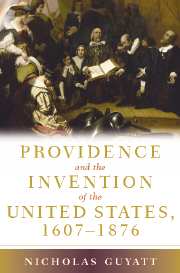Book contents
- Frontmatter
- Contents
- Acknowledgments
- Introduction
- PART ONE BRITAIN, AMERICA, AND THE EMERGENCE OF PROVIDENTIAL SEPARATISM
- PART TWO PROVIDENCE, RACE, AND THE LIMITS OF REVOLUTION
- 4 “Our Glorious Example”: The Limits of Revolutionary Providentialism
- 5 “Deifying Prejudice”: Race and Removal in the Early Republic
- 6 “Divided Destinies”: The Providential Meanings of American Slavery
- 7 “The Regenerated Nation”: The Civil War and the Price of Reunion
- 8 William Lloyd Garrison's Complaint
- Index
5 - “Deifying Prejudice”: Race and Removal in the Early Republic
Published online by Cambridge University Press: 12 December 2009
- Frontmatter
- Contents
- Acknowledgments
- Introduction
- PART ONE BRITAIN, AMERICA, AND THE EMERGENCE OF PROVIDENTIAL SEPARATISM
- PART TWO PROVIDENCE, RACE, AND THE LIMITS OF REVOLUTION
- 4 “Our Glorious Example”: The Limits of Revolutionary Providentialism
- 5 “Deifying Prejudice”: Race and Removal in the Early Republic
- 6 “Divided Destinies”: The Providential Meanings of American Slavery
- 7 “The Regenerated Nation”: The Civil War and the Price of Reunion
- 8 William Lloyd Garrison's Complaint
- Index
Summary
In 1783 Yale president Ezra Stiles addressed the troubling question of racial diversity in the new United States. Urging white Americans to have faith in “God's good providence,” he suggested that blacks and Indians would “gradually vanish” as the white population increased. By 1815 this prediction had been thoroughly confounded. Though increasingly assailed by the imperatives of expansion, Indians and blacks refused to “vanish” as Stiles had envisaged. White Americans had thus to reckon with a series of difficult questions about national development and providential intention. Did God require the United States to offer citizenship to nonwhites as well as whites? Were white Americans expected to educate and enfranchise blacks and Indians? Could a single, multiracial republic take hold across the entire continent, or did God intend to divide the vast territory of North America along racial lines?
After the War of 1812, the core assumptions of historical providentialism – that the United States had been specially favored by God and that its illustrious past presaged a glorious future – were seriously tested by the persistence of Indians and blacks on the American continent. Those white Americans who defended slavery, or who sought the removal of blacks and Indians, offered a variety of providential schemes in which God had purposely excluded nonwhites from citizenship. To secure the nation's grand destiny, and to ensure that indigenous peoples and Africans would ultimately benefit, they argued that white Americans should promote racial separation and eschew shortsighted altruism.
- Type
- Chapter
- Information
- Providence and the Invention of the United States, 1607–1876 , pp. 173 - 213Publisher: Cambridge University PressPrint publication year: 2007



